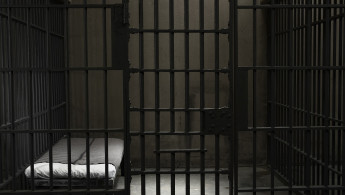Families of missing Palestinian detainees in Iraq plead for information about their fate
The location of the detained Palestinians and their current situation is unknown. In a petition addressed to the Iraqi premier, the "Palestinians of Iraq" group listed the names and dates of 33 Palestinians jailed over a 13-year period.
About 13 of the people on the list were detained between 2005 and 2007, when US forces still had a heavy presence in Iraq and the country was torn apart by sectarian violence and civil war.
The other Palestinians listed by the group were detained from 2009 onwards.
The petition, which was signed by dozens of relatives of detained Palestinians, said that "long years had passed" since the detainees had disappeared.
"We don't know anything about them or where they are. We have visited many security branches and centres and found no sign of them. We call on you, Your Excellency, to look into our and our relatives' situation. Some of the detainees' mothers have died because of their grief over their sons," the petition to Al-Kadhimi added.
Some of the Palestinians on the list are believed to have been arrested by US forces during the American occupation of Iraq, which lasted from 2003 until 2010.
American soldiers would regularly carry out raids in Iraqi cities at the time and detain people on a routine basis. In addition, Iraqi security forces would sometimes target the homes of Palestinians in Baghdad, while others were arrested at their workplaces.
Some of the detained Palestinians were seen on Iraqi television news broadcasts after their arrests but disappeared shortly after, with no further information about their whereabouts coming to light.
Sectarian discrimination and persecution
Before the US invasion of Iraq in 2003, there were approximately 34,000 Palestinians in Iraq but today only about 10,000 remain. After 2003, Palestinians - who are mostly Sunni - were subject to persecution and sectarian violence by Iran-backed Shia militias.
Many were accused of supporting former Iraqi dictator Saddam Hussein, who gave rhetorical and some financial support to the Palestinian cause.
Many Palestinians in Iraq were evicted from their homes and sacked from their jobs.
After 2006, some were subjected to targeted killings or abducted by militias, according to the UNHCR. Most of the Palestinians left Iraq as a result.
Read also: Palestinian refugees want out as Iraq moves closer to Iran
In 2017, parliament repealed a law that gave Palestinians in the country the same rights as Iraqis "until all Palestine is liberated".
As a result, Palestinians lost their ration cards and right to be employed in the Iraqi public sector.
The New Arab's Arabic-language service spoke to Mohammed Abu Omar, who confirmed that the two family members were detained by the "Wolf Brigade", a notorious militia unit attached to the Iraqi interior ministry which has been accused of sectarian violence and targeting Palestinians.
Waiting nine years for a phone call
He said that two days after their detention in 2005, a member of the Wolf Brigade called the family and demanded $50,000 in order to release the two men.
"We paid them half of what they asked for and they released one of them, on the basis that the second one would be released later, but after that he disappeared," Abu Omar said.
He said the name of one of the disappeared relatives was Luay but did not reveal the identity of the other due to safety concerns.
"In 2011, someone from the Iraqi Human Rights Commission called me and told me that Luay is still alive and gave me accurate details about him. He said that he would let me hear his voice and speak to him soon but that the circumstances were difficult [at the time]," he said.
"He also told me that Luay was in a secret prison discovered by the Human Rights Commission. He didn't ask for any money but he was afraid that his details and phone number would become known. After this I heard nothing more about the matter."
Abu Omar has been waiting for a call from the Human Rights Commission employee since 2011, who told him that he didn't want information about his efforts to find the men being revealed.
An Iraqi member of parliament, who preferred to remain anonymous, told The New Arab’s Arabic language service that the matter should be investigated by the Supreme Judicial Council, due to the government being responsible for most of these arrests.
"The Palestinians were arrested publicly and in broad daylight by government forces and there are eyewitnesses and evidence to confirm this," the MP said.
The lawmaker pointed out the contradiction between pro-government militia and Baghdad's public support for the Palestinian cause, and the poor treatment of Palestinians in Iraq.
"Support for the Palestinian cause should begin in Iraq with justice for Palestinians. They have been subject to harm and great injustices in recent years by American troops, government forces, armed factions, and lately parliament, which has stripped them of their rights," the MP added.
"The Human Rights Commission has also abandoned them."
| Facebook Post |
Follow us on Facebook, Twitter and Instagram to stay connected





 Follow the Middle East's top stories in English at The New Arab on Google News
Follow the Middle East's top stories in English at The New Arab on Google News


